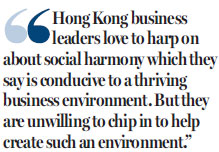Employers need a social conscience
Updated: 2016-06-23 07:40
By Peter Liang(HK Edition)
|
|||||||
Peter Liang argues that the business community must do more to promote social harmony, otherwise the city will continue to experience division and unrest in future
The newly elected chairman of the powerful General Chamber of Commerce Stephen Ng Tin-hoi threw a wet blanket over the heated public debate on statutory working hours, branding the idea a product of the old economy.
In an interview published in the chamber's in-house monthly magazine, Ng, who is also chairman and managing director of business conglomerate Wharf Ltd, also urged the government to faithfully adhere to its non-intervention policy so as not to distort the operation of the free market.
Ng represents the business sector which has apparently chosen to ignore that the laissez-faire policy was the product of an even older economy in the Dickensian era when women and young children toiled for long hours in dreadful mills and lived at subsistence wages in horrible slums. The plight of the workers in those times has served as a reminder that without the government acting as an umpire, free market forces could be manipulated by the holders of capital for their own benefits.

Since then, significant progress has been made in ensuring that workers are entitled to a share of the economic gains. In the process, governments in various capitalist economies have become increasingly involved in the protection of workers' rights by legislating and enforcing comprehensive labor laws. In many developed economies, workers are entitled to numerous social benefits which are the envy of their Hong Kong counterparts.
Among the top contenders in the ranking of world's most competitive economies, Hong Kong lags far behind Singapore and Switzerland in terms of social benefits and protection of workers' rights. The Hong Kong government has conceded that its long-standing hands-off economic policy is falling behind the times.
Even the most ardent advocate of non-interventionism cannot gloss over the fact that Hong Kong has the highest income inequality among all developed economies. The rapidly widening wealth gap has become a source of public discontent which has manifested itself in frequent demonstrations that occasionally turned violent.
But any attempt in the past to introduce even the most basic labor law was met with stiff resistance from the business sector. Take the minimum wage law for example. To appease businesses, the amount was set at a level so low that it was superseded by the market rate, rendering the law completely meaningless.
Much tougher battles between employers and workers lie ahead.
Talks on the proposed statutory working hours have stalled because of the walkout by labor representatives who accused those representing employers have flatly rejected the idea and refused to consider any form of compromise. Opponents of the proposal have maintained that the additional overtime payments to workers mandated by the proposed law would cripple many small- to medium-sized enterprises.
An even bigger battle is being fought over the proposed universal retirement scheme. The existing Mandatory Provident Fund (MPF) scheme is widely seen to be ineffectual because of the highly controversial provision that allows the employer to offset severance pay against the outstanding balance in the worker's MPF account. Workers have been clamoring for a better deal for a long time.
The government responded with a new proposal which it immediately shot down by including the argument that the scheme, as proposed, would not be financially sustainable without having to raise taxes. This qualifier has predictably fueled the anger of the various workers' groups and consolidated the opposition of the business sector.
At a public forum, Felix Chung Kwok-pan, legislative councilor and chairman of the pro-business Liberal Party, stated that employers should not be held responsible for the care of their retired workers. Nobody at the forum followed up with the question of who should. That is because in the Hong Kong context, the answer is clear: The employees themselves, of course.
That is not the case in Singapore or other developed economies where governments assume the responsibility of ensuring that most retirees have sufficient means to live out the remaining years of their lives. This is usually accomplished by higher taxes and greater contributions from businesses which obviously have a keener sense of social responsibility than their Hong Kong counterparts.
Hong Kong business leaders love to harp on about social harmony which they say is conducive to a thriving business environment. But they are unwilling to chip in to help create such an environment.
They must learn in this knowledge-based new economy that they can no longer have their cake and eat it, too.
The author is a veteran current affairs commentator.
(HK Edition 06/23/2016 page9)